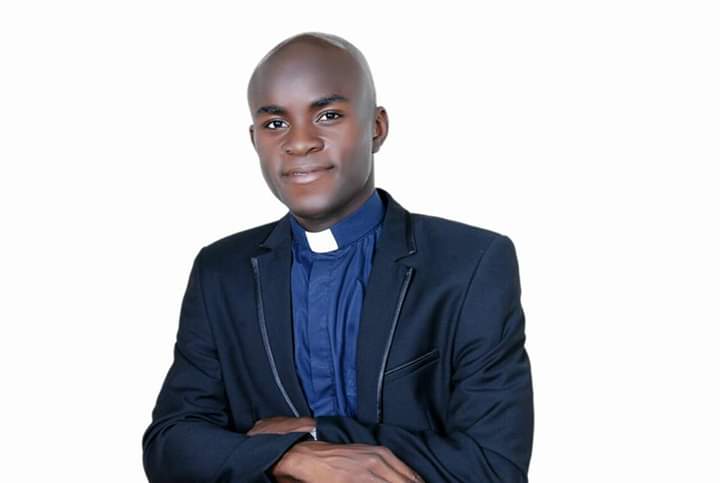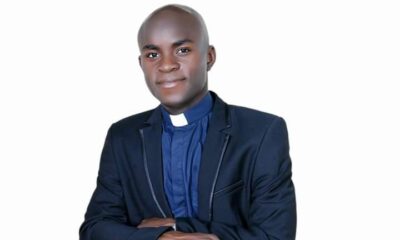Homilies & Reflections
6th Sunday In Ordinary Time Year B by Rev Fr. Lucas Binnah Junior
Wherever you go, whatever you do, do not burn your bridges. You may cross them one day!
First Reading: Leviticus 13:1-2.44-46/Responsorial Psalm: Psalm 32:1-2.5.11 (R. 7) Second Reading: I Corinthians 10:31-11:1/Gospel Accl.: Luke 7:16/Gospel: Mark 1:40-45
Theme: DISTANCE SOCIAL-DISTANCING
With the COVID-19 pandemic, many of us are more than familiar with the established health protocols, particularly, social distancing. In Jewish tradition, not only were diseases, especially those of virulent nature leading to leprosy, explained in terms of a spiritual cause and effect, there was also a system of isolation and ostracization of victims. Most of the time, the social stigma in isolating victims of leprosy brought untold hardships more than the actual sickness. Again, such situations were also seen as a result of sin committed by the sufferer. It was believed that the victim had done something against God or their neighbour (s), and thus, the sickness was a sign of punishment. Stigma kills more than real disease. It is in this context of Jewish worldview, that the first reading and the Gospel are to be interpreted. The second reading exhorts us to seek the advantage of others and not to stigmatise them. We are to do everything to the glory of God.
Rather than being treated with dignity, respect and confidentiality as standard health practice requires, the sufferer of leprosy was made to announce his or her sickness publicly. They must wear torn clothes with disordered hair and shielded upper lip and cry out: “Unclean, unclean” (cf. Lev. 13:45). As long as the sickness persisted, the victim continued to live in isolation. When they survived it, they needed clearance from a priest in order to qualify them to live among others in society. In the name of public hygiene, isolation and quarantine are to be taken as good health practice. The recent Ebola virus that killed thousands of people particularly in Liberia and Sierra Leone required quarantine of victims in order to curtail the rate of infection. Currently, the global coronavirus scourge and surge has necessitated strict enforcement of health protocols without which the disease would escape containment. Be that as it may, the manner of approach in dealing with leprosy in traditional Jewish culture was psychologically humiliating and socially dehumanizing. Not only was one estranged from God by immediate neighbours, they were also alienated from society and from the self. By the grace of God and thanks to science, leprosy can now be cured, and we are optimistic that COVID-19 would soon be nipped in the bud as well!
It is from the aforementioned that Jesus in the Gospel takes a better approach to the suffering leper, and by extension, caring for all the sick. Let us draw some contrasts from the first reading and the Gospel. Unlike the first reading, where it was illegal for a leper to approach people, in the Gospel, he approached Jesus, and Jesus gave him attention. Again, the law forbade people from touching lepers, but Jesus touched the leper to bring healing to him. As well, whereas Jewish society was pitiless towards the leper, Jesus was deeply empathetic to the leper. For instance, notice the tone and compassion in the conversation that ensued between them. The leper said: “If you will, you can make me clean.” Jesus responded and said: “I will; be clean” (Mk. 1: 40-41). Finally, to restore the leper fully to God, society and himself, Jesus said to him: “… But go, show yourself to the priest, and offer for your cleansing what Moses commanded, for a proof to the people (Mk. 1:44). Like a patient who had survived COVID-19 with a clean sheet of a negative antigen or PCR/molecular test, the cured leper could not hide his joy and perhaps, the words of Psalm 32 could be found on his lips: “Blessed is he whose transgression is forgiven, whose sin is remitted. Blessed the man to whom the Lord imputes no guilt, in whose spirit is no guile. To you I have acknowledged my sin; my guilt I did not hide, I said, ‘I will confess my transgression to the Lord.’ You are a hiding place for me; you surround me with cries of deliverance” (Ps. 32:1- 2, 5.7). This is what happens to us when we come back to God with all our hearts. Christ is able to mould again our shattered, scattered and tattered lives ruined by the pandemic of sin. His healing touch can make us whole again. He loves us deeply. With Christ, liberation comes to outcasts and downcasts. With him, the marginalized finds a voice and a friend closer than a brother or a sister. Whatever sin had done to us, if we can approach Christ in all sincerity, humility, contrition and repentance, he will restore us that we may find healing again.
Two things are instructive from the conversation that ensued between Jesus and the leper. First, we need to understand that sin is like leprosy. It estranges us from God, community and the self. Repentance is the bridge that can reconcile us back to God, others and the self. We need total change (metanoia) for a holistic restoration. And whether we are clergy or lay faithful, we all need Sacramental Confession where, like the leper, we are directed by Jesus, ‘Do not tell anyone about this, but go, show yourself to the priest, and offer for your cleansing what Moses commanded, for a proof to the people’ (Mk. 1:44)! Secondly, all care-givers such as priests, doctors, nurses and other health professionals; leaders such as parents, teachers and politicians, and all who have others under their control must treat people with heartfelt compassion. Those who work just for money without the smile of sympathy, hand of empathy and heart of kindness for sufferers and the sick must take a cue from Jesus! There is a story of a woman who recently recovered from COVID19. Her family and friends were very afraid to welcome her back into their homes. We need not be afraid to welcome back recovered patients of COVID-19, to show them love and to pray for the happy repose of those who have already succumbed to the disease. Social distancing does not mean severing relationships. While we observe the health protocols, we need also to seek the good and advantage of others in society and to be one another’s keeper. This is our Christian duty to oblige. When we are absorbed in ourselves, our own interests and personal projects, we tend to forget that others matter too! Rather than exclude the sick, weak, aged and poor, we are to make society better by caring for one another. If leaders can think of the welfare of those they govern, all will feel belonged, accepted and treasured. By this, everybody will make it a duty to contribute their quota to our common development as children of One God.
Today in our world, we suffer from various ‘leprosies’ such as hatred, jealousy, unforgiveness, bitterness, selfishness, corruption, malpractices, violence, bigotry, atheism, secularism, nepotism, racism, etc. What makes them serious problems is that we see nothing wrong with these situations and we carry them out with impunity. Society can even make us believe that, that is the normal practice; that is the system; that, our situation cannot be changed; that, we cannot be healed. This is structural sin. This is the deception that lies at the heart of sin. It keeps us in guilt, shame and stagnation. The good news is that, there is no condition beyond the medicine of God’s mercy. Sin, no matter its greatness cannot escape the cure of the Blood of Jesus. John the Baptist says: “Behold, the Lamb of God who takes away the sin of the world” (Jn. 1:29). Notice what the Baptist says. He did not say the Lamb that covers the sin of the world, but that it takes away! The prophet Micah had shown this character of God when he said: “What God is like you, who takes away iniquity and passes over the sin of the remnant of your inheritance? No longer will he send forth his fury, because he is willing to be merciful. He will turn back and have mercy on us. He will put away our iniquities, and he will cast all our sins into the depths of the sea” (Mic. 7: 18- 19). In Jesus, sin loses its power, brokenness is healed, dignity is restored, joy is renewed, life revived and the excluded included in the family of God and the community.
Dearly Beloved, in order to escape spiritual leprosy, that is, sin in its variety, we need to heed the admonition of St. Paul in the second reading. He says: “Brethren, whether you eat or drink, or whatever you do, do all to the glory of God” (I Cor. 10:31). When we give limitless liberty to our human desires, we go astray. Even what may be called ordinary needs to be attended to with the intention of giving glory to God. Consequently, let us learn to please God in word and action as Jesus showed us in his earthly life and ministry. A wiseman was asked, “Sir, in which field could I make a great career?’ With a smile, he said, “Be a good human being. There is a lot of opportunity in this area and very little competition.” We need one another. We must cherish and respect one another. May God touch our hearts that we may change and show compassion to one another. Happy Sunday and may God bless us! Remember to: #Distance-Social-Distancing# By Rev. Fr. Lucas Binnah Junior, C.S.Sp
Sharing is caring!
Ghana Catholic News aim to provide up to date news on the Catholic Church in Ghana on various disciplines such as diocese, priesthood, programs/events, promoting of the Catholic faith, daily readings, homilies, Catechism, etc.







